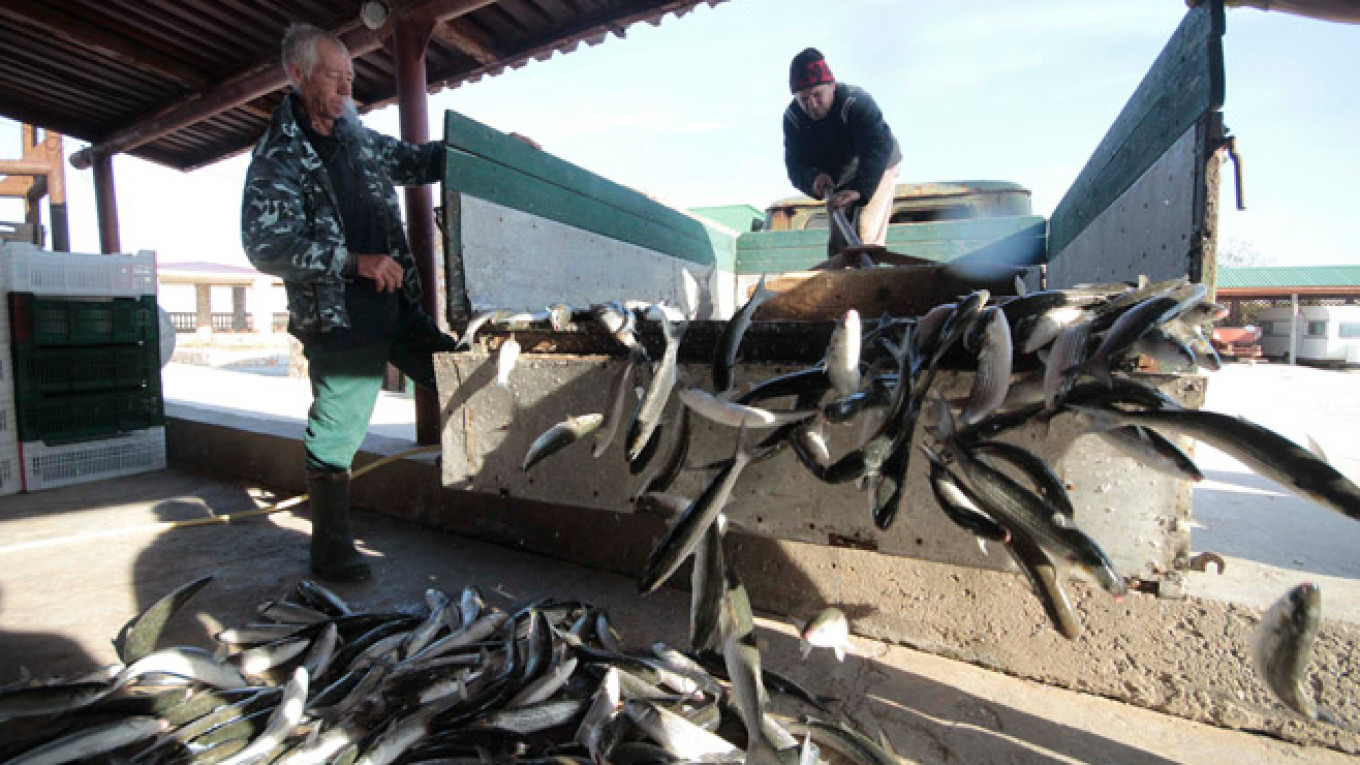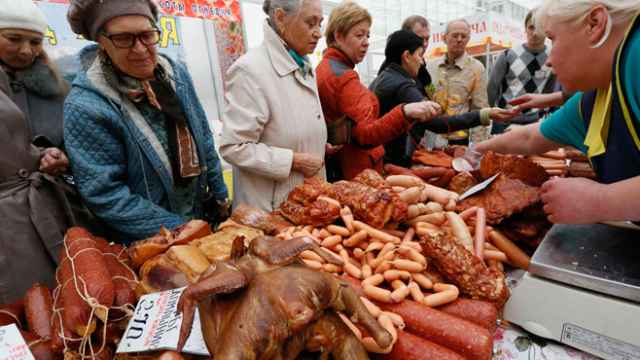The salmon-catching season in Russia's Far East is almost over, and refrigerators in Russia's port city of Vladivostok are filled to the brim.
The next destination for the fish, given the political climate, should be Russian plates.
This summer, Russia banned food imports from countries that had sanctioned it over Moscow's alleged hand in Ukraine's crisis. Prior to the ban, Russia imported over 850,000 tons of fish per year, mostly from Norway, Iceland, the Faroe Islands and China. Norway, formerly the largest supplier of farmed salmon to Russia, is now out of the picture.
Russian politicians leaped on the ban as an opportunity for Russia to repatriate its vast resource base and boost local produce.
But Russia's fish remains stockpiled at sea ports.
Food Prices Sent Sky High
The import ban has sent food prices skyrocketing: year-on-year inflation hit 8 percent in September, according to Russia's statistical agency Rosstat. Fish now costs 14 percent more than a year ago.
But even with their wares fetching higher prices on the domestic market, and despite the exhortations of the country's political leadership, fish producers say rail tariffs for the long journey west to Moscow are too high.
They are selling to China and other neighboring countries. Of the more than 4 million tons of fish caught in Russian waters every year, nearly 2 million tons are exported — mainly to Asian countries such as China, Japan and South Korea.
"Thousands of kilometers separate Russia's Far East and the country's central regions. This has made it more profitable for producers to sell the fish in Japan, Korea or China," said Olga Schedrova, a spokesperson for Russia's fish industry watchdog, Rosrybolovstvo.
State monopoly Russian Railways has fired back, though, saying they've been more than accommodating: "Our rail tariffs have stayed unchanged from last year to create favorable conditions to transport fish caught in the Pacific," Sergei Ryabov, deputy head of far-eastern division of Russian Railways was quoted by the TASS news agency as saying Wednesday.
Extra subsidies to allow Russian Railways to either decrease tariffs or directly support fish producers are being discussed, Rosrybolovstvo agency head Ilya Shestakov told Interfax on Wednesday.
But these may come too late to take advantage of demand. Distributors and retailers in European Russia are finding alternative suppliers as far afield as Chile and Argentina. Meanwhile, Norwegian fish is worming its way back onto the market via a repackaging stopover in Belarus, Russia's partner in a customs union.
Easy Pickings Float Away
Government bureaucracy, not travel time, is the biggest reason Russia's markets are so import heavy, says German Zverev, the head of Russia's Pollock Catchers Association.
"A ship with salmon from Norway or shrimp from Denmark usually goes through the necessary sanitation procedures in a matter of hours, while it could take several days for a ship carrying fish caught in Russian waters," Zverev said at the executive meeting of the board of Russian Union of Industrialists and Entrepreneurs on Wednesday.
As the result, imported fish flows to Russia not because it is cheaper or of a higher quality but due to the better designed economic mechanism behind these supplies, Zverev said.
Right or Wrong?
The head of a fish processing plant, who asked that his name not be published, tossed aside Zverev's claims and instead blamed the fish producers for the lack of balance on the market.
"There is no difference between sanitation requirements for a vessel that came to a Russian port with fish it caught in Norway's or Russia's waters," he said.
It is the price and the terms that matter, he said, and the seamen and those who buy fish on the shore cannot agree on them.
"For a fisherman there is no such thing as national interests. He has his quota, which he pays for, and he has his price. If he cannot sell the fish for the desired price [in Russia] he goes elsewhere," the executive said.
Contact the author at a.panin@imedia.ru
A Message from The Moscow Times:
Dear readers,
We are facing unprecedented challenges. Russia's Prosecutor General's Office has designated The Moscow Times as an "undesirable" organization, criminalizing our work and putting our staff at risk of prosecution. This follows our earlier unjust labeling as a "foreign agent."
These actions are direct attempts to silence independent journalism in Russia. The authorities claim our work "discredits the decisions of the Russian leadership." We see things differently: we strive to provide accurate, unbiased reporting on Russia.
We, the journalists of The Moscow Times, refuse to be silenced. But to continue our work, we need your help.
Your support, no matter how small, makes a world of difference. If you can, please support us monthly starting from just $2. It's quick to set up, and every contribution makes a significant impact.
By supporting The Moscow Times, you're defending open, independent journalism in the face of repression. Thank you for standing with us.
Remind me later.






